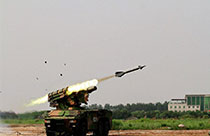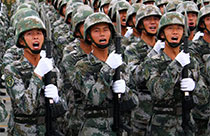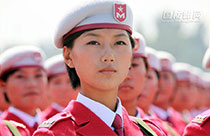

WASHINGTON, Sept. 1 -- Few in the West remember the fact that China was the first country to enter what would become World War II, and it was an ally of the United States and Britain from just after Pearl Harbor in 1941 till Japan's surrender in 1945, an Oxford expert said.
In an article titled "Forgotten ally? China's unsung role in World War II (WWII)," circulated on U.S. TV network CNN's website Tuesday, Rana Mitter, a professor of modern Chinese politics and history at the University of Oxford, elaborated China's role in World War II.
As China will hold a major parade in Beijing on Thursday to commemorate the 70th anniversary of the end of World War II, "China's memory of the war is becoming more, not less, important," he wrote.
"Chinese suffering during the war is not in dispute," he added, referring to the fact that during China's resistance against Japanese aggression from 1937 to 1945, the fire of war scourged half of the Chinese territory, with around 260 million Chinese involved in the war and more than 35 million people killed or wounded. The direct economic loss reached some 100 billion U.S. dollars at then price.
The United States and China were allies during WWII and more than 250,000 Americans served in what was known as the "China-Burma-India" theater, many photos showed.
On July 7, 1937, Japanese troops attacked Lugou Bridge, also known as Marco Polo Bridge, a crucial access point to Beijing. This was the beginning of China's eight-year war of resistance against full-scale Japanese aggression. A year later, by mid-1938, the Chinese military situation was desperate.
Many cities of eastern and central China, including Shanghai, Nanjing and Wuhan, fell in Japanese hands. Many foreign observers assumed that China could not hold out, and a Japanese victory over China was most likely.
Nonetheless, China refused to surrender, retreating inland to carry on resistance. "This decision changed the fate of Asia," Mitter said.
If China had surrendered in 1938, Japan would have controlled China for a generation or more. Japan's forces might have turned toward the Soviet Union, Southeast Asia, or even India, the article reads.
The European and Asian wars might never have come together as they did after Pearl Harbor in 1941.
As Chinese hung on, and after Pearl Harbor, the war became genuinely global. The western Allies and China were united in their war against Japan.
China's contributions were very important to the war efforts. China held down huge numbers of Japanese troops on its territory and acted as an example to other non-Western countries, showing that it was possible to fight with hegemonism and strongly oppose imperialism, Mitter stressed.
 'Enemy planes' intercepted by Hongqi-7B air-defense missiles
'Enemy planes' intercepted by Hongqi-7B air-defense missiles Blind date with bikini girls in Nanjing
Blind date with bikini girls in Nanjing Amazing photos of Chinese fighter jets
Amazing photos of Chinese fighter jets Chinese soldiers participate in training for V-Day parade
Chinese soldiers participate in training for V-Day parade Painting: Lonely women in Forbidden City
Painting: Lonely women in Forbidden City China and Russia hold joint drill in Sea of Japan
China and Russia hold joint drill in Sea of Japan 'Goddess' in Taiwan McDonald's
'Goddess' in Taiwan McDonald's Female soldiers at military parades
Female soldiers at military parades Photos of campus belle doing splits go viral
Photos of campus belle doing splits go viral Best blade forward
Best blade forward Infographic: Parsing China's massive V-day parade
Infographic: Parsing China's massive V-day parade Giant panda cub receives medical care in Guangzhou
Giant panda cub receives medical care in Guangzhou China celebrates 70th Anniversary of Victory of World Anti-Fascist War
China celebrates 70th Anniversary of Victory of World Anti-Fascist WarDay|Week